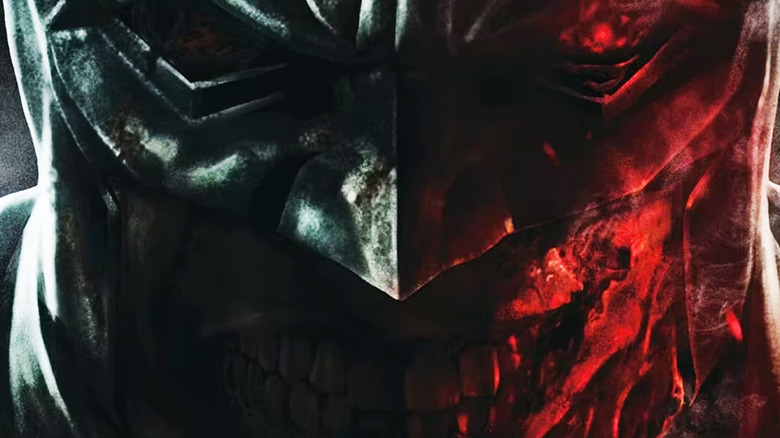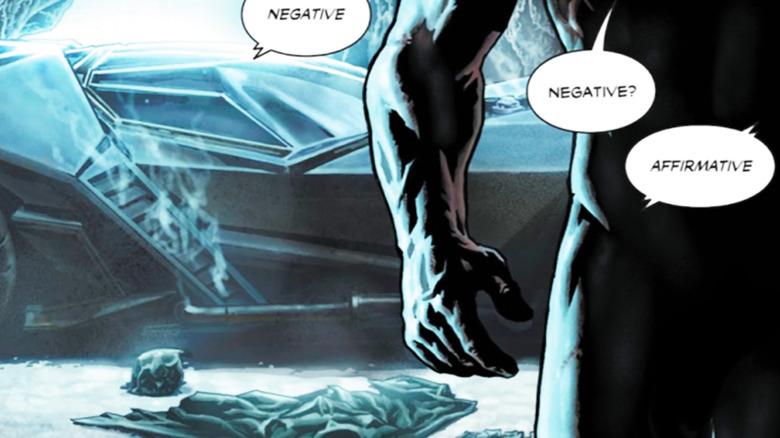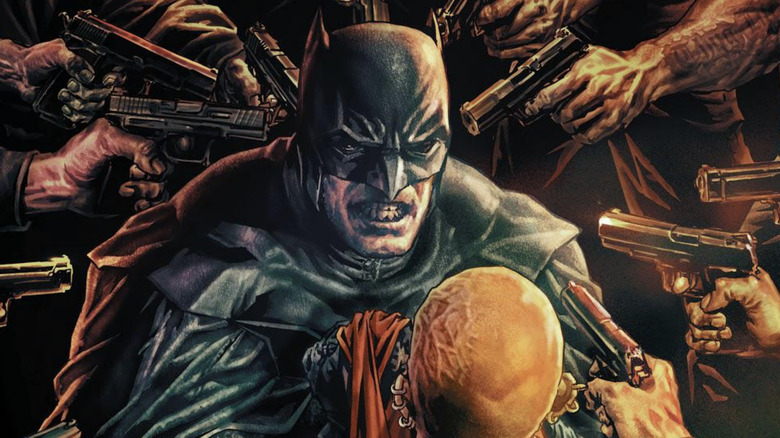This 'Banned' Batman Comic Is Valuable For A Hilarious, Outrageous Reason
Comic book collectors all have their grails, whether it's a first appearance, a low print run issue, or a rare variant cover. Some, however, want to see Batman's nether regions and will pay top dollar for the privilege. Such was the case with 2018's "Batman: Damned," which contained an explicit panel that was censored following the initial print run, thereby ensuring those original books shot up in value.
In 2018, DC Comics did what Warner Bros. should have done a long time ago. The company created DC Black Label, an imprint on which they could publish more mature, standalone stories showcasing creators' unique artistic visions without having to worry about in-universe continuity. Had Warners done this with their big screen DC adaptations rather than trying to emulate the Marvel Cinematic Universe model, we might well have avoided box office disasters of super-heroic proportions like 2022's "The Flash." DC Black Label, meanwhile, gave rise to some inventive, novel takes on classic characters long before "Absolute Batman" made major changes to Bruce Wayne's story — most notably with the first title to be published under the imprint: "Batman: Damned."
Released in September 2018, this three-issue limited series came from writer Brian Azzarello and artist Lee Bermejo, whose simultaneously grimy and gorgeous art was perfect for the inaugural Black Label release. Aside from a good story and immersive art style, "Batman: Damned" was also just a very satisfying object to own, with a glossy cover in a prestige format that felt very premium. With all that in mind, the book didn't necessarily need much else to make it a desirable release. But when it was first published, it also came complete with full frontal Bruce Wayne nudity, prompting DC to censor future prints and sending resale prices through the roof.
DC quickly censored Batman: Damned
When DC Black Label was announced in March 2018, it was touted as a creative refuge where writers and artists could tell their stories unimpeded by the larger canon. In a press release, publisher and soon-to-be Chief Creative Officer at DC, Jim Lee, said that the imprint "doubles down on our commitment to working with all-star talent and trusting them to tell epic, moving stories that only they can tell with the highest levels of creative freedom." When "Batman: Damned arrived in September, however, that commitment to creative freedom was immediately called into question.
"Damned" is one of the best Batman comics of recent years, telling a supernatural horror story in which the Joker's body is discovered on a Gotham City bridge, prompting an investigation that sees the Dark Knight venture through the supernatural recesses of his hometown. The book caused somewhat of a stir when it debuted, not because of its immersive, dark depiction of Gotham or the immaculate art, but because in one panel, Bruce Wayne is seen in the Batcave walking away from his Batmobile, having shed his clothes. Barely discernible in the dark is the hint of a penis, which apparently was enough to send everyone, including the DC leadership, into meltdown.
DC quickly announced it would censor all reprints and digital copies, but the first print run included 115,000 uncensored copies, so the cat was already out of the bag, or rather, the privates very much out of the pants. At the time, The Hollywood Reporter cited a "source close to the project" as claiming DC had decided the nudity didn't "add to the story," which is a strange decision to make after the long-delayed comic book had already gone out.
An original Batman: Damned is now a collectors item
According to DC, the offending member in "Batman: Damned" was the result of a production error, whereby the panel in question was brightened, which simultaneously made Bruce Wayne's privates more discernible. Whatever the case, at New York Comic Con 2018, Jim Lee told Polygon the "Batman: Damned" controversy had made DC comics "look at what Black Label is and think about whether these elements are additive to the story." Co-publisher Dan DiDio added, "It's something we wished never happened because it really took the attention away from what we thought was quality storytelling." All of which was just confusing, as DC had arguably added to the controversy by censoring reprints.
Naturally, the debacle caused uncensored copies to become sought-after items on the secondhand market. First-prints initially shot up to the $100 mark and beyond — a considerable jump from the original $6.99 cover price. Today, an original "Batman: Damned" #1 print goes for anywhere from $50 to more than $100 less than 10 years from its original publication.
Four years after the whole fiasco, Lee Bermejo spoke to Popverse, saying that he was surprised by the controversy. "I honestly thought we had come so far in comics," he said, "that we could treat something like Batman in the same way we look at Greek or Roman statues... in other words, as art." A dispirited-sounding Bermejo added that he learned comic books will "never be high art" and that his "Damned" miniseries was "still a comic about a guy in a silly costume." Still, the artist remains proud of the work he did on the book, pointing to how he and Brian Azzarello did something "a bit risky with the story and the structure." Too risky for DC Black Label, apparently.


